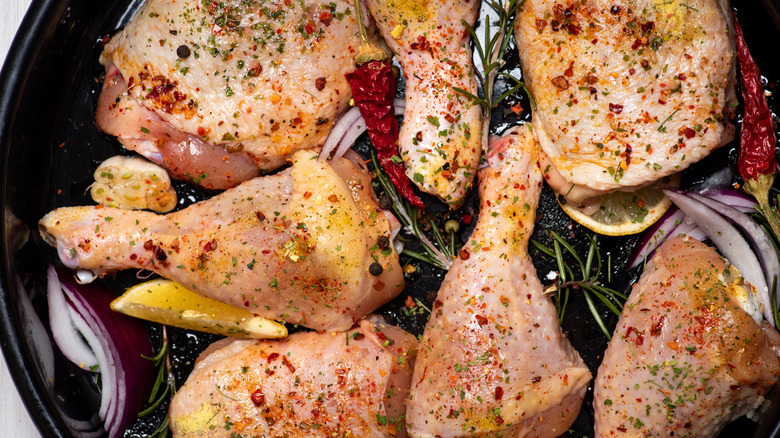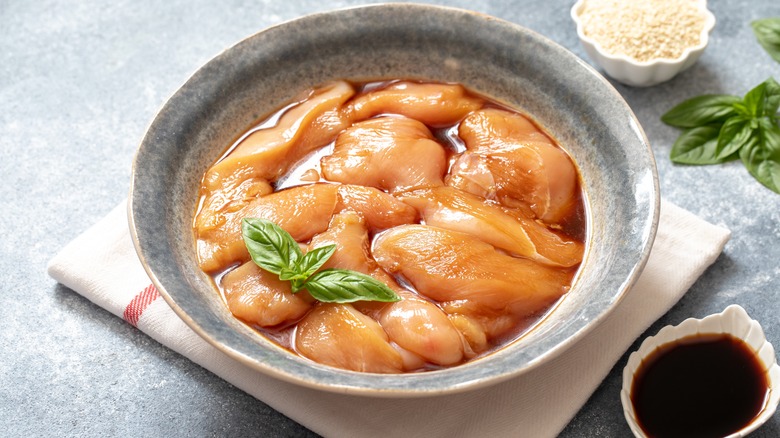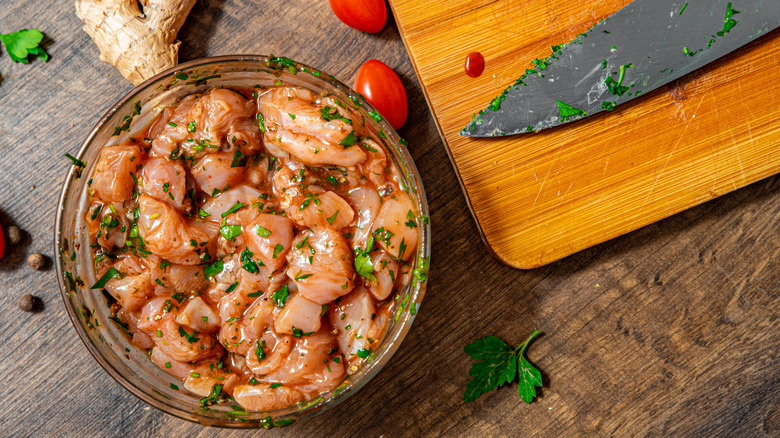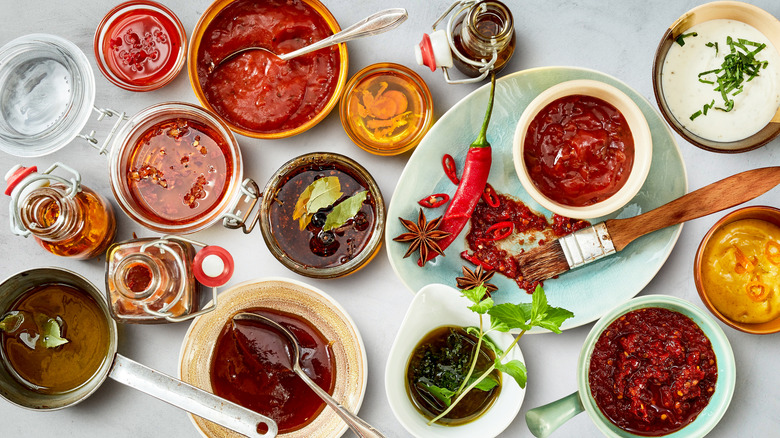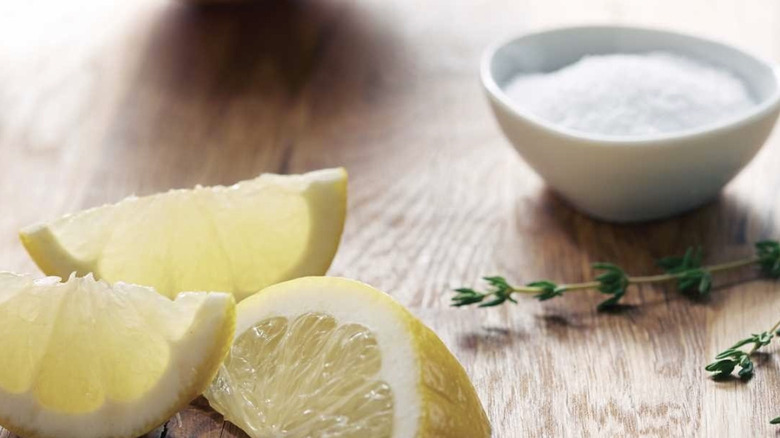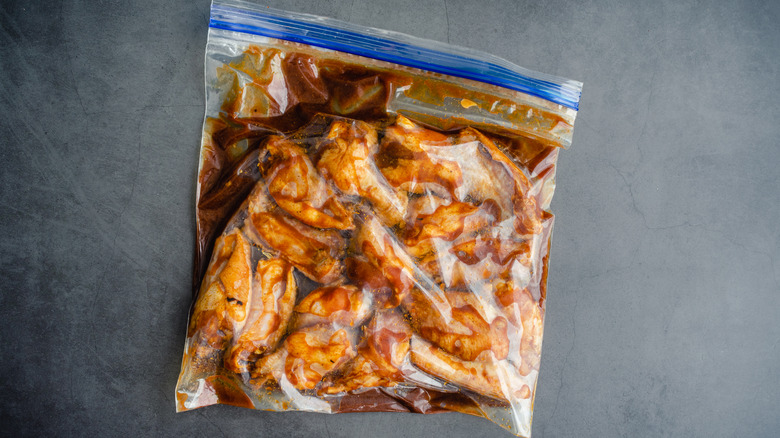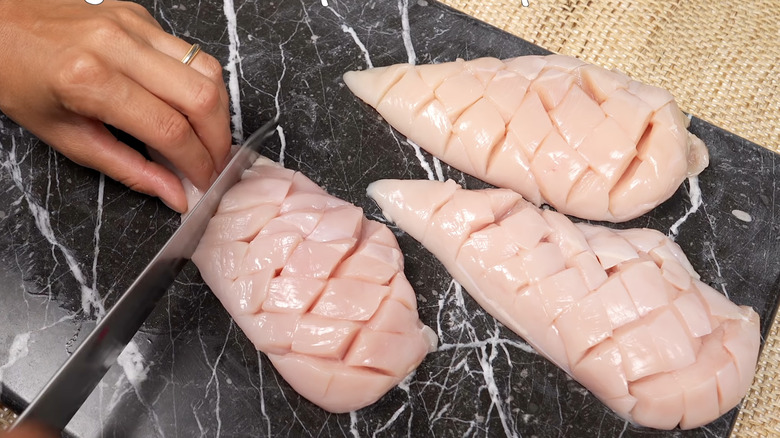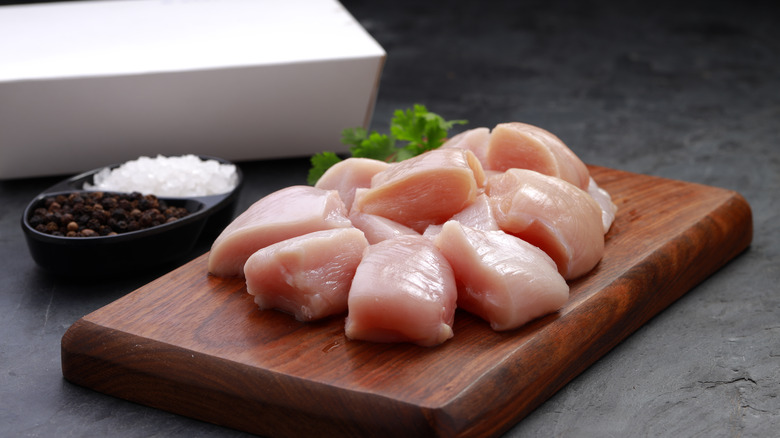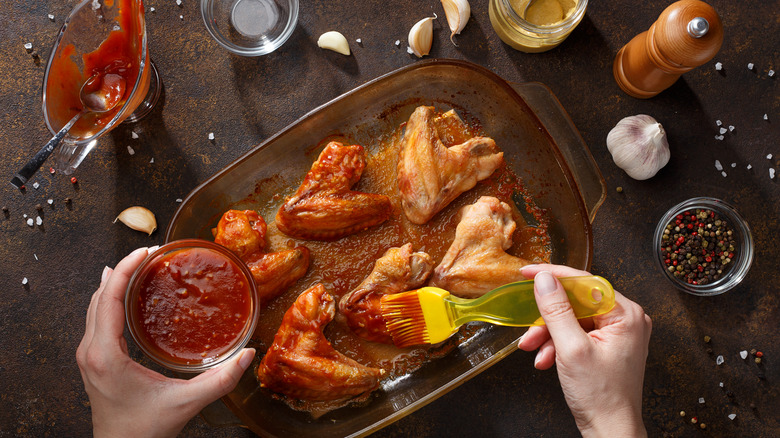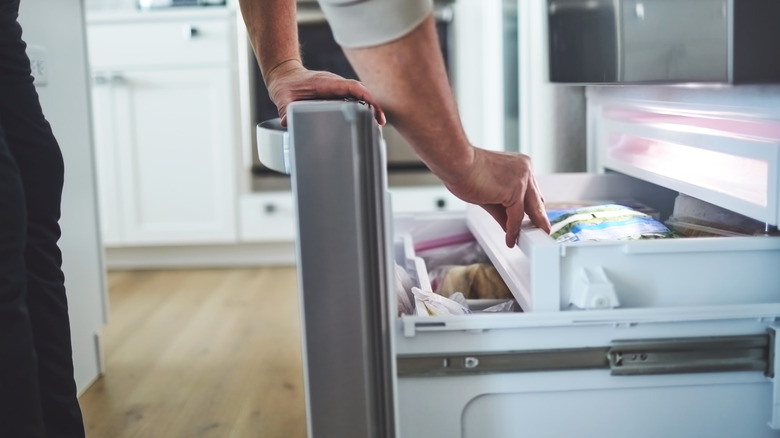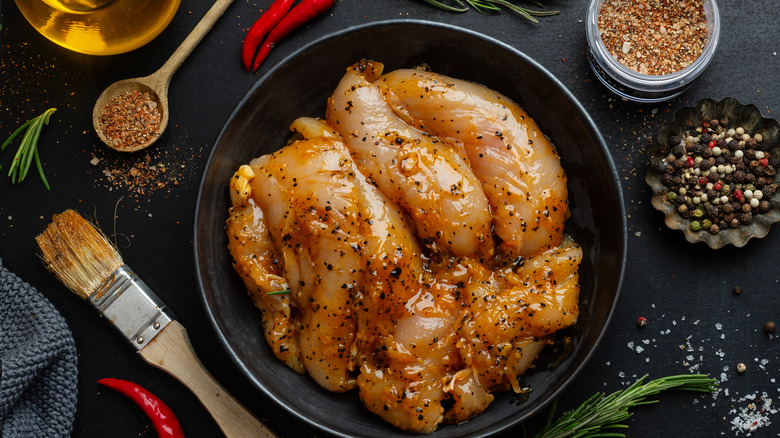Mistakes Everyone Makes When Marinating Chicken
Despite their potential to transform a dish, marinades can be tricky to master. They possess the power to elevate flavors, tenderize meats, and infuse food with rich aromas. However, realizing their full culinary potential requires some careful and precise handling of all the ingredients involved. This is because even a minor misstep can leave you with a dish that's not just disappointing but potentially unsafe to eat.
When it comes to marinating chicken, there are a few essential steps to follow that will help you ensure optimal results. A well-balanced chicken marinade that's applied to the poultry for just the right amount of time not only imparts flavor but also can make the protein both juicy and tender. However, sometimes things aren't as straightforward as they may first appear. Chicken, being a relatively lean meat, requires some careful handling during the marinating process so that it won't be overwhelmed by the flavors of the marinade. Cooks will also want to be wary of compromising the texture of this meat with their marinades.
To help you out, here are some of the most common mistakes people make when marinating chickens and the best ways to avoid them. With these in mind, you can achieve perfectly-marinated chicken glory.
Not allowing enough marinating time
When it comes to marinating meat, trying to take shortcuts simply isn't going to cut it. To ensure a succulent feast, you have to set aside sufficient time for the protein to fully absorb the flavors of the marinade's ingredients. The duration of the marinating process should depend on the type and size of the meat you're working with.
Since chicken isn't as dense as other meats like beef, it tends to absorb the marinade more efficiently. As a rule of thumb, an entire chicken should bathe in a marinade for between four and 12 hours in the refrigerator. When it comes to chicken quarters with the bones still in, opt for a shorter marinade of one to six hours. That time significantly decreases for smaller chicken cuts. For instance, a bone-in chicken breast should be marinated between one and two hours, while a skinless and boneless chicken breast can be marinated for an even shorter duration that ranges from 30 minutes to two hours.
Those who find themselves racing against the clock can reduce marinating time by dividing the poultry into smaller pieces. This approach allows more of the chicken's surface area to come into contact with the marinade, increasing efficiency. Of course, whether or not this strategy is feasible depends on the specific recipe you're using.
Over-marinating the chicken
While under-marinating may leave you with a chicken that's a little more bland than desired, over-marinating poultry can render it inedible. According to the USDA, chicken can be marinated for up to 48 hours and still be safe to eat. However, such prolonged exposure to a marinade is likely to ruin its texture. In fact, no meat should be marinated for longer than 24 hours — less if we are talking about smaller and more porous cuts. If you accidentally leave your meat in a marinade for 24 hours, cook it immediately or freeze it (provided that it hasn't already been defrosted).
Marinades are generally divided into two basic types: acidic and enzymatic. Excessive time in marinades that contain acids like vinegar, lemon juice, wine, or apple juice can turn the meat stringy and tough. Meanwhile, enzymatic marinades, which contain ingredients such as ginger, pineapple, or guava, work by breaking down muscle fiber and connective tissue. As such, an overly long soak in an enzymatic marinade is likely to result in mushy chicken.
Over-marinating chicken can also overshadow the natural taste of the poultry. Even though marinades don't penetrate more than one-eighth of an inch into the meat, the external layer of the meat can reach a point of oversaturation that could make your meal taste out of whack.
Not patting the chicken dry before and after marinating
There is some disagreement as to whether you should wash raw chicken before you marinate it. While some recommend rinsing your chicken under cold water before cooking, others are adamant that the step is unnecessary and may contribute to making you ill. This is because washing raw chicken can lead to the spread of harmful bacteria, such as campylobacter or salmonella, all over your sink. The last thing you want is to contaminate your kitchen with any germs that might cause diners to get sick.
Regardless of whether or not you choose to wash your chicken before placing it in the marinade, it's important to gently pat it dry to minimize surface moisture. Too much doesn't just dilute the marinade, but can also prevent it from adhering to the poultry. If you're worried about cross-contamination, minimize the risk by patting the raw chicken dry with a paper towel, which you will then discard right away.
Once the chicken is removed from a marinade, it's also smart to pat it dry once again before you start to cook. The more marinade there is on the surface of the chicken, the more prone that cut is to steam and become soggy rather than crispy and brown. Excessive marinade is also more likely to make the chicken stick to the skillet.
Not balancing the flavors of the marinade
Making marinade can be a balancing act. After all, you don't want the final sauce to be bland or overpower the flavor of the chicken. When it comes to crafting marinade, instead of emptying your fridge of leftover ingredients, take a little time to think about how you want the final product to taste. Remember that keeping things simple can go a long way.
A good chicken marinade consists of three components: acid, seasoning, and fat. First, pick your acidic ingredients, such as lime juice, wine, or vinegar. Next, combine them with fat, such as vegetable oil. Finally, season the marinade with spices and herbs. For extra tenderizing power, you can throw in enzymatic ingredients such as honey or pineapple juice. Celebrity chef and TV personality Bobby Flay revealed his secret ingredient for marinating chicken on "The Rachael Ray Show": Greek yogurt. He explained that the dairy both adds flavor and helps to keep the chicken juicy.
While the list of chicken marinade ingredients is practically endless, there are certain ingredients you should take care to avoid. These include oils with a low smoke point, such as flaxseed oil, as they burn at low temperatures and can imbue your culinary masterpiece with rancid flavor and perhaps even some carcinogenic compounds (via Critical Reviews in Food Science and Nutrition). Avoid fats such as butter, ghee, and coconut oil, as they solidify at room temperature and are likely to clump up in a cooled marinade.
Making the marinade overly salty or acidic
While seasoning marinades with salt is important, it's also crucial to exercise caution when adding this particular ingredient. Too much salt isn't just going to ruin the taste of the cut, but can also dry it out by drawing moisture out of the meat. As such, when adding salt, it's best to be conservative and take into account the other ingredients in your mix. For instance, if your marinade contains soy sauce or Worcestershire sauce, you'll want to err on the side of caution, given that those ingredients already contain sodium. Remember that you can always add salt during or even after cooking the poultry, but it's pretty hard to take it out.
Similarly, it's crucial to exercise caution when you're incorporating acidic ingredients into your marinade. Just like salt, adding too much acid to your chicken marinade will affect the meat's flavor and texture, potentially leaving the poultry stringy and unappetizing. As a general rule, when making marinades, aim for a one-to-one ratio of fatty and acidic ingredients.
Using the wrong container to marinate chicken
Novices to the marinating game tend to opt for whatever container they can find in their kitchen. While this usually won't result in a catastrophe, when marinating chicken, the truth is that the shape and material of the container do matter. First, it's crucial to ensure that the vessel is large enough to cover the entire chicken in marinade. About half a cup of marinade should be sufficient for each pound of protein. The container should also be sealable or come with a lid to prevent any accidental spills and cross-contamination while the raw chicken is infused with flavor. Alternatively, you can seal a container with a plastic wrap.
Containers for marinating meat should be made from food-grade plastic, ceramic, or glass. They can also be made from food-grade stainless steel. However, other metal marinating vessels such as aluminum ones are a huge no-no since they react with the acidity in the marinade, which may alter both the flavor and color of the chicken. If you don't have the right container on hand, you can also marinate chicken in large plastic freezer bags. Just be sure to discard them after use, as they will have touched raw chicken.
Not piercing or scoring the chicken
While this may catch some off guard, the reality is that marinades only penetrate around one-eighth of an inch into the meat. This is why puncturing the surface of your poultry with a fork or scoring it with a knife before a marinade soak can help infuse it with flavor. Rather than pooling the marinade on the surface, poking holes in the chicken or cutting it can create channels for all those wonderful oils, acids, and spices to seep deeper into the meat.
When scoring the surface of the chicken, take care not to slice too deeply, as this can make the meat look unsightly or even cause it to fall apart. If you're following a recipe where the final appearance of the meal is part of its appeal, you may opt for piercing the protein rather than scoring it.
One Reddit user swears by a somewhat different method to imbue chicken with flavor. "Instead of poking holes and applying spices, etc. [to] the surface, it might help to lift the skin at one end and rub your fat/spice/acid mixture or marinade to the meat beneath," they said. "I do this for my whole roasted chicken and just salt the skin (compensating for whatever salt went under) and am always pleased with the results."
Ignoring basic food safety
When it comes to marinating raw chicken, it's crucial to follow certain guidelines to ensure a safe and flavorful meal. Ignoring these dos and don'ts can mean the difference between enjoying a succulent dish and exposing yourself to a foodborne illness. For example, while chicken should normally be marinated in the refrigerator, some choose to speed up the infusion process by leaving it out at room temperature. But beware: this leaves the meat more susceptible to bacterial growth.
According to the USDA, you should never leave poultry at room temperature for longer than two hours. If the temperature of your kitchen reaches 90 degrees, cut that down to just an hour. As such, if you do choose to marinate poultry outside the refrigerator, be extra careful to mind the time. If you're thawing chicken, it's also best to do so in the refrigerator rather than on the kitchen bench or in the sink, for the same bacteria-blocking reasons.
To minimize the risk of spreading bacteria, it's also important to keep raw chicken away from other foods to prevent cross-contamination. If you're marinating chicken in the refrigerator, always place it on the bottom shelf in case the container it's in happens to leak. In addition, always thoroughly wash the kitchen tools and other surfaces that come in contact with the chicken. Never reuse any utensils that have touched raw poultry to handle other ingredients.
Reusing marinade without boiling it first
When making marinade, it's best to make too much rather than not enough, as you want all of your chicken cuts to be completely submerged in the rich flavors of the sauce. If you end up with leftover marinade, don't just toss it in the trash. It's likely to come in handy for basting the poultry during the cooking process.
Since reusing the marinade that's been in contact with raw chicken is never safe, it's best to divide the marinade into two batches: one for marinating and the other for basting and serving. If you still find yourself with an excess of marinade that has been contaminated by raw chicken, there's a way to save it. To kill any bacteria that may be lurking in the marinade, the USDA recommends that you bring the mixture to a boil. Keep it on the stovetop for 5 minutes. This is likely to turn it into a glaze, which will also make it perfect as a sauce. If you find that the marinade becomes too thick, mix it with a little chicken broth to thin it out.
Not freezing the marinated chicken
While some advise against freezing marinated chicken, complaining that the process changes its texture, others say that poultry can be frozen, provided that it's done the right way. Not only is freezing marinated chicken convenient, but it's also a great way to prepare for dinner parties when you may not have much time to prep your poultry. One caveat here is that you're starting with a fresh chicken that hasn't been pre-frozen. Additionally, dairy such as yogurt can separate from the rest of the marinade ingredients when frozen, so it's probably a good idea to skip it if you plan to freeze your marinade.
For best results, place the chicken and marinade in sealable freezer bags, squeezing out as much air as possible. If you are worried about leaks, place the bag with the chicken in another, larger bag. Be sure to label it with the dates you froze it and when it should be used, as the protein should be consumed within three months. When you're ready to turn your marinated chicken into dinner, simply take it out of the freezer and let it defrost in the fridge for at least 8 hours.
Not letting marinated chicken come back to room temperature before cooking
Whether you opt for grilling, baking, or even stir-frying your marinated poultry, it's vital to bring the chicken to room temperature before you commence the cooking process. And since most people marinate their protein in the fridge, this will take a little forethought. For optimal results, let the cut of meat sit outside the refrigerator for around an hour. Of course, the exact timing should depend on the type and size of the meat you're preparing, as smaller cuts will likely require less time and larger ones more.
Giving your marinated chicken some quality counter time will ensure that the poultry isn't just cooked evenly, but also turns out tender and juicy. This is because cooking a cold bird — or even one that's still thawing — as soon as it's taken out of the refrigerator can result in poultry that's charred on the outside and raw on the inside. It can also cause rips in the skin, making the final product look unappealing on the dinner table.
